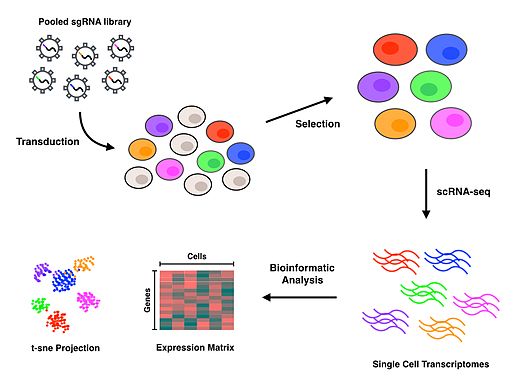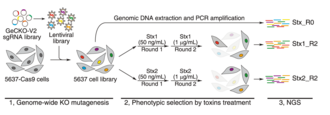Functional genomics is a field of molecular biology that attempts to describe gene (and protein) functions and interactions. Functional genomics make use of the vast data generated by genomic and transcriptomic projects (such as genome sequencing projects and RNA sequencing). Functional genomics focuses on the dynamic aspects such as gene transcription, translation, regulation of gene expression and protein–protein interactions, as opposed to the static aspects of the genomic information such as DNA sequence
or structures. A key characteristic of functional genomics studies is
their genome-wide approach to these questions, generally involving
high-throughput methods rather than a more traditional “gene-by-gene”
approach.
Deep mutational scan of the RNA recognition motif(RRM2) of a yeast PolyA binding protein (Pab1)
Definition and goals of functional genomics
In order to understand functional genomics it is important to first define function. In their paper
Graur et al. define function in two possible ways. These are "Selected
effect" and "Causal Role". The "Selected Effect" function refers to the
function for which a trait(DNA, RNA, protein etc.) is selected for. The
"Causal role" function refers to the function that a trait is sufficient
and necessary for. Functional genomics usually tests the "Causal role"
definition of function.
The goal of functional genomics is to understand the function of
genes or proteins, eventually all components of a genome. The term
functional genomics is often used to refer to the many technical approaches to study an organism's genes and proteins, including the "biochemical, cellular, and/or physiological properties of each and every gene product" while some authors include the study of nongenic elements in their definition. Functional genomics may also include studies of natural genetic variation over time (such as an organism's development) or space (such as its body regions), as well as functional disruptions such as mutations.
The promise of functional genomics is to generate and synthesize
genomic and proteomic knowledge into an understanding of the dynamic
properties of an organism. This could potentially provide a more
complete picture of how the genome specifies function compared to
studies of single genes. Integration of functional genomics data is
often a part of systems biology approaches.
Techniques and applications
Functional genomics includes function-related aspects of the genome itself such as mutation and polymorphism (such as single nucleotide polymorphism (SNP) analysis), as well as the measurement of molecular activities. The latter comprise a number of "-omics" such as transcriptomics (gene expression), proteomics (protein production), and metabolomics. Functional genomics uses mostly multiplex techniques to measure the abundance of many or all gene products such as mRNAs or proteins within a biological sample.
A more focused functional genomics approach might test the function of
all variants of one gene and quantify the effects of mutants by using
sequencing as a readout of activity. Together these measurement
modalities endeavor to quantitate the various biological processes and
improve our understanding of gene and protein functions and
interactions.
At the DNA level
Genetic interaction mapping
Systematic pairwise deletion of genes or inhibition of gene
expression can be used to identify genes with related function, even if
they do not interact physically. Epistasis refers to the fact that
effects for two different gene knockouts may not be additive; that is,
the phenotype that results when two genes are inhibited may be different
from the sum of the effects of single knockouts.
DNA/Protein interactions
Proteins
formed by the translation of the mRNA (messenger RNA, a coded
information from DNA for protein synthesis) play a major role in
regulating gene expression. To understand how they regulate gene
expression it is necessary to identify DNA sequences that they interact
with. Techniques have been developed to identify sites of DNA-protein
interactions. These include Chip-sequencing, CUT&RUN sequencing and Calling Cards.
DNA accessibility assays
Assays
have been developed to identify regions of the genome that are
accessible. These regions of open chromatin are candidate regulatory
regions. These
assays include ATAC-seq, DNase-Seq and FAIRE-Seq.
At the RNA level
Microarrays
Microarrays measure the amount of mRNA in a sample that corresponds
to a given gene or probe DNA sequence. Probe sequences are immobilized
on a solid surface and allowed to hybridize
with fluorescently labeled “target” mRNA. The intensity of fluorescence
of a spot is proportional to the amount of target sequence that has
hybridized to that spot, and therefore to the abundance of that mRNA
sequence in the sample. Microarrays allow for identification of
candidate genes involved in a given process based on variation between
transcript levels for different conditions and shared expression
patterns with genes of known function.
SAGE
Serial analysis of gene expression
(SAGE) is an alternate method of analysis based on RNA sequencing
rather than hybridization. SAGE relies on the sequencing of 10–17 base
pair tags which are unique to each gene. These tags are produced from poly-A mRNA
and ligated end-to-end before sequencing. SAGE gives an unbiased
measurement of the number of transcripts per cell, since it does not
depend on prior knowledge of what transcripts to study (as microarrays
do).
RNA sequencing
RNA sequencing has taken over microarray and SAGE technology in
recent years, as noted in 2016, and has become the most efficient way to
study transcription and gene expression. This is typically done by next-generation sequencing.
A subset of sequenced RNAs are small RNAs, a class of non-coding
RNA molecules that are key regulators of transcriptional and
post-transcriptional gene silencing, or RNA silencing. Next generation sequencing is the gold standard tool for non-coding RNA discovery, profiling and expression analysis.
Massively Parallel Reporter Assays (MPRAs)
Massively parallel reporter assays is a technology to test the cis-regulatory activity of DNA sequences.
MPRAs use a plasmid with a synthetic cis-regulatory element upstream of
a promoter driving a synthetic gene such as Green Fluorescent Protein. A
library of cis-regulatory elements is usually tested using MPRAs, a
library can contain from hundreds to thousands of cis-regulatory
elements. The cis-regulatory activity of the elements is assayed by
using the downstream reporter activity. The activity of all the library
members is assayed in parallel using barcodes for each cis-regulatory
element. One limitation of MPRAs is that the activity is assayed on a
plasmid and may not capture all aspects of gene regulation observed in
the genome.
STARR-seq
STARR-seq is a technique similar to MPRAs to assay enhancer activity
of randomly sheared genomic fragments. In the original publication,
randomly sheared fragments of the Drosophila genome were placed
downstream of a minimal promoter. Candidate enhancers amongst the
randomly sheared fragments will transcribe themselves using the minimal
promoter. By using sequencing as a readout and controlling for input
amounts of each sequence the strength of putative enhancers are assayed
by this method.
Perturb-seq
Overview of Perturb-seq workflow
Perturb-seq couples CRISPR mediated gene knockdowns with single-cell
gene expression. Linear models are used to calculate the effect of the
knockdown of a single gene on the expression of multiple genes.
At the protein level
Yeast two-hybrid system
A yeast two-hybrid screening
(Y2H) tests a "bait" protein against many potential interacting
proteins ("prey") to identify physical protein–protein interactions.
This system is based on a transcription factor, originally GAL4,
whose separate DNA-binding and transcription activation domains are
both required in order for the protein to cause transcription of a
reporter gene. In a Y2H screen, the "bait" protein is fused to the
binding domain of GAL4, and a library of potential "prey" (interacting)
proteins is recombinantly expressed in a vector with the activation
domain. In vivo interaction of bait and prey proteins in a yeast cell
brings the activation and binding domains of GAL4 close enough together
to result in expression of a reporter gene.
It is also possible to systematically test a library of bait proteins
against a library of prey proteins to identify all possible interactions
in a cell.
AP/MS
Affinity purification and mass spectrometry
(AP/MS) is able to identify proteins that interact with one another in
complexes. Complexes of proteins are allowed to form around a particular
“bait” protein. The bait protein is identified using an antibody or a
recombinant tag which allows it to be extracted along with any proteins
that have formed a complex with it. The proteins are then digested into
short peptide fragments and mass spectrometry is used to identify the proteins based on the mass-to-charge ratios of those fragments.
Deep Mutational Scanning
In
Deep mutational scanning every possible amino acid change in a given
protein is first synthesized. The activity of each of these protein
variants is assayed in parallel using barcodes for each variant. By
comparing the activity to the wild-type protein, the effect of each
mutation is identified. While it is possible to assay every possible
single amino-acid change due to combinatorics two or more concurrent
mutations are hard to test. Deep Mutational scanning experiments have
also been used to infer protein structure and protein-protein
interactions.
Loss-of-function techniques
Mutagenesis
Gene function can be investigated by systematically “knocking out” genes one by one. This is done by either deletion or disruption of function (such as by insertional mutagenesis) and the resulting organisms are screened for phenotypes that provide clues to the function of the disrupted gene.
RNAi
RNA interference (RNAi) methods can be used to transiently silence or
knock down gene expression using ~20 base-pair double-stranded RNA
typically delivered by transfection of synthetic ~20-mer
short-interfering RNA molecules (siRNAs) or by virally encoded
short-hairpin RNAs (shRNAs). RNAi screens, typically performed in cell
culture-based assays or experimental organisms (such as C. elegans)
can be used to systematically disrupt nearly every gene in a genome or
subsets of genes (sub-genomes); possible functions of disrupted genes
can be assigned based on observed phenotypes.
CRISPR screens
An example of a CRISPR loss-of-function screen.
CRISPR-Cas9 has been used to delete genes in a multiplexed manner in
cell-lines. Quantifying the amount of guide-RNAs for each gene before
and after the experiment can point towards essential genes. If a
guide-RNA disrupts an essential gene it will lead to the loss of that
cell and hence there will be a depletion of that particular guide-RNA
after the screen. In a recent CRISPR-cas9 experiment in mammalian
cell-lines, around 2000 genes were found to be essential in multiple
cell-lines.
Some of these genes were essential in only one cell-line. Most of genes
are part of multi-protein complexes. This approach can be used to
identify synthetic lethality by using the appropriate genetic
background. CRISPRi and CRISPRa enable loss-of-function and
gain-of-function screens in a similar manner. CRISPRi identified ~2100
essential genes in the K562 cell-line.
CRISPR deletion screens have also been used to identify potential
regulatory elements of a gene. For example, a technique called ScanDel
was published which attempted this approach. The authors deleted regions
outside a gene of interest(HPRT1 involved in a Mendelian disorder) in
an attempt to identify regulatory elements of this gene.
Gassperini et al. did not identify any distal regulatory elements for
HPRT1 using this approach, however such approaches can be extended to
other genes of interest.
Functional annotations for genes
Genome annotation
Putative genes can be identified by scanning a genome for regions
likely to encode proteins, based on characteristics such as long open reading frames, transcriptional initiation sequences, and polyadenylation
sites. A sequence identified as a putative gene must be confirmed by
further evidence, such as similarity to cDNA or EST sequences from the
same organism, similarity of the predicted protein sequence to known
proteins, association with promoter sequences, or evidence that mutating
the sequence produces an observable phenotype.
Rosetta stone approach
The
Rosetta stone approach is a computational method for de-novo protein
function prediction. It is based on the hypothesis that some proteins
involved in a given physiological process may exist as two separate
genes in one organism and as a single gene in another. Genomes are
scanned for sequences that are independent in one organism and in a
single open reading frame in another. If two genes have fused, it is
predicted that they have similar biological functions that make such
co-regulation advantageous.
Bioinformatics methods for Functional genomics
Because of the large quantity of data produced by these techniques and the desire to find biologically meaningful patterns, bioinformatics is crucial to analysis of functional genomics data. Examples of techniques in this class are data clustering or principal component analysis for unsupervised machine learning (class detection) as well as artificial neural networks or support vector machines for supervised machine learning (class prediction, classification).
Functional enrichment analysis is used to determine the extent of over-
or under-expression (positive- or negative- regulators in case of RNAi
screens) of functional categories relative to a background sets. Gene ontology based enrichment analysis are provided by DAVID and gene set enrichment analysis (GSEA), pathway based analysis by Ingenuity and Pathway studio and protein complex based analysis by COMPLEAT.
An overview of a phydms workflow
New computational methods have been developed for understanding the
results of a deep mutational scanning experiment. 'phydms' compares the
result of a deep mutational scanning experiment to a phylogenetic tree.
This allows the user to infer if the selection process in nature
applies similar constraints on a protein as the results of the deep
mutational scan indicate. This may allow an experimenter to choose
between different experimental conditions based on how well they reflect
nature. Deep mutational scanning has also been used to infer
protein-protein interactions.
The authors used a thermodynamic model to predict the effects of
mutations in different parts of a dimer. Deep mutational structure can
also be used to infer protein structure. Strong positive epistasis
between two mutations in a deep mutational scan can be indicative of two
parts of the protein that are close to each other in 3-D space. This
information can then be used to infer protein structure. A proof of
principle of this approach was shown by two groups using the protein
GB1.
Results from MPRA experiments have required machine learning
approaches to interpret the data. A gapped k-mer SVM model has been used
to infer the kmers that are enriched within cis-regulatory sequences
with high activity compared to sequences with lower activity.
These models provide high predictive power. Deep learning and random
forest approaches have also been used to interpret the results of these
high-dimensional experiments. These models are beginning to help develop a better understanding of non-coding DNA function towards gene-regulation.
Consortium projects focused on Functional Genomics
The ENCODE project
The ENCODE (Encyclopedia of DNA elements) project is an in-depth
analysis of the human genome whose goal is to identify all the
functional elements of genomic DNA, in both coding and noncoding
regions. Important results include evidence from genomic tiling arrays
that most nucleotides are transcribed as coding transcripts, noncoding
RNAs, or random transcripts, the discovery of additional transcriptional
regulatory sites, further elucidation of chromatin-modifying
mechanisms.
The Genotype-Tissue Expression (GTEx) project
Samples used and eQTLs discovered in GTEx v6
The GTEx project is a human genetics project aimed at understanding
the role of genetic variation in shaping variation in the transcriptome
across tissues. The project has collected a variety of tissue samples
(> 50 different tissues) from more than 700 post-mortem donors. This
has resulted in the collection of >11,000 samples. GTEx has helped
understand the tissue-sharing and tissue-specificity of EQTLs.






